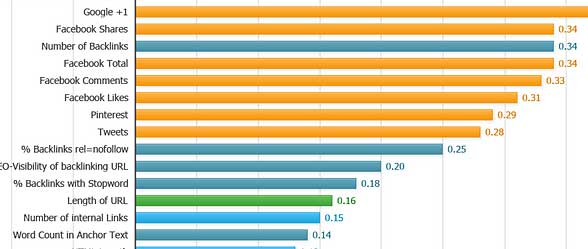Google Search Engine Rankings – What’s Working Now In SEO

A recent study by SearchMetrics recently set out to scientifically measure what drives top Google search engine rankings today.
The results once again confirmed exactly what I have been teaching over the last year:
That social media is a major source of top search engine rankings!
Understanding these changes is so important that I recently did a webinar, where I talked through each of the factors that most influences top rankings from the search engines.
Here’s a replay of that webinar.
It got a bit technical at times, but to truly understand how search engines work, you have to get technical at times!
It’s well worth carefully watching this entire video!
Watch this space for additional bonus content coming very soon.
Plus, click here to get more information about the Social SEO Intensive
And here to get more information about the Social SEO Bootcamp
What are you going to do differently as a result of this video? Let me know by leaving a comment below. And don’t forget to +1, Share, Like, Tweet and Pin this post!
Cool, Easy Infographic Templates
I talk a lot about infographics in the webinar and shared a resource IÂ use to create mine – lots of choices for you to try out. Even if you have a graphic designer, you can play around with the templates and then hand it over to them for the final touches. You’ll be thinking infographically in no time!
Click here to get your –> Infographic Templates!





Don,
I’ve studied with many of the so-called gurus about Internet marketing and social media. You always deliver the most timely, up to date and relevant information about Social Media marketing and the internet.
Your knowledge, wisdom and advice have allowed me to prosper and help my clients wade through the intricate web of Social Media and Internet Marketing.
You practice what you preach. Each of your webinars, products and service are of extreme value and by themselves are worth every minute of time invested in listening.
Thanks for being a reliable, expert in Internet and Social Media Marketing
Scott Leslie
You’re welcome Scott!
I work hard at it!
Don
this might be a dumb question but, when is the best times to post to Google+, Facebook fan page, Twitter?
Ah, that’s the subject of another post. Watch this site, coming soon.
Don
DON! Please always give us more detail! The basics are found everywhere. We are the experts, man! And we understand this stuff. We don’t know it and from what I’m watching (I had to stop just to tell you MORE DETAIL) we have naturally started to shift toward what is working now, but we are still focusing too much attention on what is not having much impact at all or just going about it the wrong way now.
I am so grateful to you for sharing and explaining this new study about what is working now with SEO. You are helping all us passionate people get our message out to the people who need it. Being at the top of Google is more than just money, it is a message as well. We are the thinkers and influencers of our time! We can NOT underestimate that. Thanks again! MUAH!
Thanks Jessica!
Remember, not everyone is an expert, so sometimes I have to give basics.
Don
Don,
Thanks for your reply. I guess the thing that frustrates me is that we weren’t trying to ‘game’ the system at all. We had an e-commerce site to start with and people who shop on that e-commerce site are interested in a lot of niches that are all part of the exact same market that the e-commerce site targets. So, we decided to create niche websites to meet our customer’s needs by providing high quality, valuable content that they are searching for online. We used exact match keyword domains, but I don’t see what the problem is with that. If you can get a domain with the keywords in it you might as well.
Then we interlinked all of the sites together because they are all very, very closely related. Someone interested in stuff on our blogs could very well need to purchase some things from our e-commerce site, and in fact they do. And vice versa, there is a very good possibility that someone shopping on the e-commerce site might also want to read the free content we provide.
I don’t see what the harm is in linking them all together. Matt Cutts has even said that if you have a handful of sites that are all related, go ahead and link them together, there is nothing wrong with that. He said when you get in to trouble is when you have dozens, hundreds, or thousands of sites all linking together.
If nine different people owned our blogs it would make perfect sense for those 9 people to link to each other and to our e-commerce site.
Anyway, I just wanted to make sure you understood how and why things were done the way they were, and that there was no ‘gaming’ the system. We are building a real business that we rely on to pay our bills, and have no intention of destroying our business by spamming or gaming the search engines.
Last question about your comment. You said you’d, “combine all of the blogs into one blog and kill the other sites.” What exactly do you mean by “kill the other sites?” I was planning on combining all of the blogs by using 301 redirects to a folder on our e-commerce site like, http://www.e-commercesite.com/all-blogs-combined-here, but ‘killing the sites’ sounds more like moving just the content to the e-commerce site and not 301 redirecting so there is absolutely no association between the two. Is that right?
Also, you didn’t say where that ‘one blog’ would be. Could you expand on that about whether you would put it on a completely different domain like http://www.newoneblog.com, or whether you’d put it on a folder on the e-commerce site like I previously mentioned?
Thanks!
Michael
A couple more questions for you. We have an e-commerce website and 9 related blogs, each one on a different domain. We have exact match keyword domains for our blogs, and we interlink all of the blogs to each other with run of site links in the headers, and we link back and forth b/w the blogs and e-commerce site with run of site links in the footers (links going from our e-comm. to each blog, and links in the footers of each blog going to about 20 pages on our e-comm. site). The reason we set things up this way is because it was working REALLY well for us before all of these Google updates. Our blogs and e-commerce site were doing very well in organic search.
Now, with all of these updates, our blog traffic and organic rankings have plummeted, and we are starting to see rankings and traffic drop for our e-commerce site too. I think the reason the blogs dropped first is because they had more run of site links to them since our e-commerce site has over 1 million pages. The blogs only have maybe 20,000 pages combined so it has taken longer for our e-commerce site to start to drop.
To solve these issues, and make the user experience better, we are thinking about combining all of our blogs in to 1 website since they are all very closely related. We think that will help our users significantly in terms of being able to navigate and find the things they are looking for.
This is where I’m not sure how to go about things. External links are still very important, so it’s nice to have 9 websites where we have control over the external links going to our e-commerce site. If we do move them to 1 website, we’ve considered moving them to a sub-domain on our e-commerce site, but with what you said about sub-domains in the webinar, and other things I’ve read, that doesn’t sound like a good idea.
If we move them to the same domain as our e-commerce site in a folder, then the links from our blogs wouldn’t be external links anymore, they would be internal, but we would have a lot more authority on our e-commerce site because, if I understand how 301 redirects work, all of the external links going to our blogs from other websites would now be links going to our e-commerce site. We’d have more referring domains, from more unique ip addresses, etc.
At this point, I’m leaning towards moving all of the blogs to our e-commerce site, but then you also said something about using our portfolio of sites to link them together from related, high traffic pages. Do you think it’s more beneficial for us to keep our 9 blogs as they are on separate domains and just be smarter about how we link to our e-commerce site, linking from related, high-traffic pages rather than run of site footer links, or do you think we’d see more benefit from moving them to our e-commerce site?
Any advice would be greatly appreciated! I know we need to make a change in terms of how our sites are linked together, but it’s tough to weight the pros and cons of each option.
Your mistake was linking them all together. Clearly, Google knows that and has punished you for it.
At this point, those multiple sites are worthless to you from a Google standpoint at least. Respectfully, let this be a lesson about trying to game the system – you’ll always lose. It may be later than sooner, but in the end, you will lose.
At this point, I’d combine all of the blog posts into one blog and kill the other sites.
Don
Hi Don,
I have a question about something you said in the webinar, which was fantastic by the way! You mentioned that there may be an issue with some WordPress plugins for related posts, specifically you showed Yet Another Related Post Plugin, and social buttons. I use YARPP, and I am not seeing any of the spam links you were referring to. If you could please clarify exactly which plugins you’ve seen issues with, and provide some more details on that, that would be great!
Working on that. It will be available soon.
Don
Hi Don,
I have a question no one seems to want to answer. Whose load time for a webpage are you and others referring too? The end user who could be on dial up or with 6mbps dsl or 40 mbps burst road runner? Or are we looking at the websites on the internet, which my site can vary as much as 3-4 seconds depending on who is checking.
I haven’t seen anything stated from Google as to what an acceptable page load time is. As far as i can tell, it’s anybody’s guess, but of course, the faster the better from the end users standpoint.
Thanks, keep up the good work.
I’m pretty confident that there’s no official arbiter of this. In fact, other than Google’s own access times, (which I’m sure they track,) my guess is that most of the speed data comes to them secondarily, as measured by things like bounce rate, time on page etc. In other words, when a page loads slowly, the visitor has a bad experience, so they leave quickly, which reflects in your overall quality score as a page/site.
And, as far as I can tell, there is no “acceptable page load time.” Faster is better rules. But if you can get under 2 seconds, you’re likely in good shape.
There’s my attempt to answer the question no one seems to answer. Of course, it’s all conjecture, because Google’s kimono remains tightly closed. But it’s my guess, based upon what I know right now.
Know something different? Have a different opinion – reply to this and let us know!
Don
Good information – timely and true – well done Don!